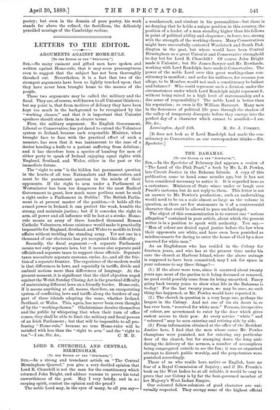LETTERS TO THE EDITOR.
ARGUMENTS AGAIN-ST HOME-RULE.
[To TER EDITOR OF THE "SPECTATOR.") SIE,—So many eminent and gifted men have spoken and written against Home-rule, that it may seem presumptuous even to suggest that the subject has not been thoroughly threshed out. Nevertheless, it is a fact that two of the strongest arguments have been so lightly touched upon, that they have never been brought home to the masses of the people.
These two arguments may be called the military and the fiscal. They are, of course, well known to all Unionist thinkers ; but my point is, that from motives of delicacy they have been kept too much in the background to be recognised by the " working classes," and that it is important that Unionist speakers should state them in clearer terms.
First, the military argument. No English Government, Liberal or Conservative, has yet dared to extend the Volunteer system to Ireland, because each responsible Minister, when brought face to face with the practical effect of such a measure, has seen that it was tantamount to the case of a doctor handing a knife to a patient suffering from delirium ; and it has therefore been a species of humbug for men of either party to speak of Ireland enjoying equal rights with England, Scotland, and Wales, either in the past or the immediate future.
The "right to arm" is the hidden but paramount question in the hearts of all true Nationalists and Home-rulers, and must be the paramount question in the minds of their opponents. If the right to arm under a Parliament at Westminster has been too dangerous for the most Radical Government to grant, how much more perilous must be such a right under a Parliament in Dublin ! The British Parlia- ment is at present master of the position,—it holds all the armed power in Ireland, it can protect the weak, humble the strong, and maintain justice ; but if it concedes the right to arm, all power and all influence will be lost at a stroke. Home- rule means an army of three hundred thousand Roman Catholic Volunteers, whose existence would make it practically impossible for England, Scotland, and Wales to meddle in Irish affairs without trebling the standing army. Yet not one in a thousand of our electorate has yet recognised this difficulty.
Secondly, the fiscal argument :—A separate Parliament means not only separate laws, but it means also separate paid officials and separate taxes to support those officials. Separate taxes necessitate separate customs, excise, &c., and all the fric- tion of a separate frontier. The experience of the modern world is that differences in laws, and especially in tariffs, divide and embroil nations more than differences of language. At the present moment, it is significant that the chief objection urged against the Welsh Sunday Closing Act is the practical difficulty of maintaining different laws on a friendly border. Home-rule, if it means anything at all, means, therefore, an exasperating system of conflicting laws and tariffs along the borders of any part of these islands adopting the same, whether Ireland, Scotland, or Wales. This, again, has never been even thought of by the "working classes." Gladstonians deceive themselves and the public by whispering that when their turn of office comes, they shall be able to limit the military and fiscal powers of an Irish Parliament ; but that will be impossible to all pro- fessing "Home-rule," because no true Home-ruler will be satisfied with less than the "right to arm" and the "right to


































 Previous page
Previous page